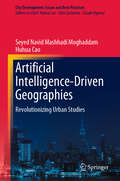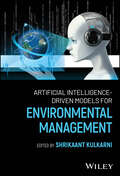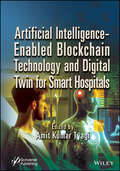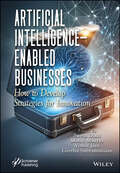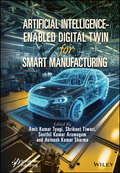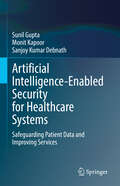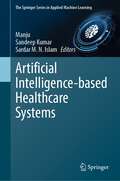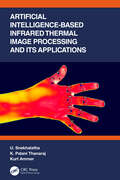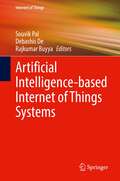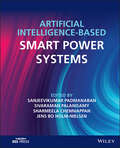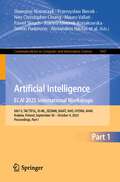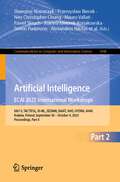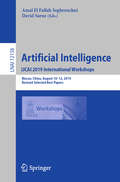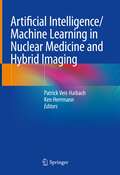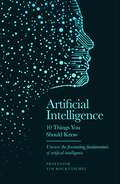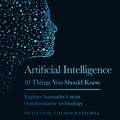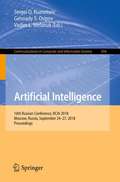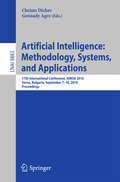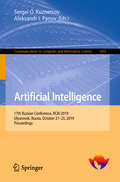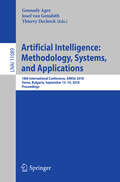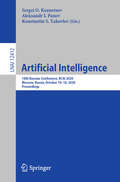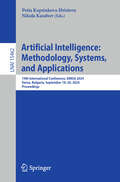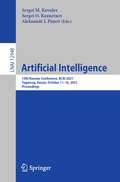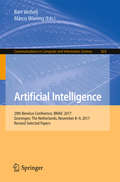- Table View
- List View
Artificial Intelligence-Driven Geographies: Revolutionizing Urban Studies (City Development: Issues and Best Practices)
by Huhua Cao Seyed Navid MoghaddamThis groundbreaking book delves deep into the history of AI, the major techniques and algorithms of machine learning and deep learning, and the critical role of data sources and processing in these disciplines. It covers a range of AI applications in human geography, including population distribution, land use, environmental risk assessment, and socioeconomic analysis. In urban planning, the book explores AI-driven approaches to smart cities, transportation management, urban growth prediction, and sustainable development, among others. As AI continues to permeate every aspect of human life, it is essential to understand and address the ethical considerations and challenges associated with AI-driven planning. This book tackles crucial issues such as data privacy, algorithmic bias, equitable access to technology, and the future of employment in the fields of geography and urban planning. In addition, it presents inspiring case studies, highlighting successful AI applications in human geography and urban planning, and offers insights into future research directions and challenges. This book is a must-read for students, researchers, and professionals in geography, urban planning, environmental studies, and related fields. It is also an invaluable resource for policymakers and urban planners seeking to leverage the power of AI to create smarter, more sustainable, and equitable cities and communities. This book equips you with the knowledge and tools to harness the potential of AI, leading the way to a better understanding of our world and a brighter future for all.
Artificial Intelligence-Driven Models for Environmental Management
by Shrikaant KulkarniStep-by-step guidelines for the development of artificial neural network-based environmental pollution models Artificial Intelligence-Driven Models for Environmental Management delves into the application of AI across a plethora of areas in environmental management, including climate forecasting, natural resource optimization, waste management, and biodiversity conservation. This book shows how AI can help in monitoring, predicting, and mitigating environmental impacts with tremendous accuracy and speed by leveraging machine learning, deep learning, and other data-driven models. The methodologies explored in this volume reflect a synthesis of computational intelligence, data science, and ecological expertise, underscoring how AI-driven systems have been making strides in managing and preserving our planet’s natural resources. The text is structured to guide readers through numerous AI models and their practical environmental management applications, showcasing theoretical foundations as well as case studies. This book also addresses the challenges and ethical considerations related to deploying AI in ecological contexts, underscoring the importance of transparency, inclusivity, and alignment with sustainability goals. Sample topics discussed in Artificial Intelligence-Driven Models for Environmental Management include: Tools and methods for monitoring and predicting environmental pollutants faster and more accuratelyAI technology for the protection of water supplies from contamination to produce healthier foodsUse of AI for the evaluation of the impacts of environmental pollution on human healthAI and waste management technologies for sustainable agriculture and soil managementThe role of AI in environmental research and sustainability and key social and economic aspects of natural resource management through AI Artificial Intelligence-Driven Models for Environmental Management is a timely, forward-thinking resource for a diverse readership, including researchers, policymakers, environmental scientists, and AI practitioners.
Artificial Intelligence-Enabled Blockchain Technology and Digital Twin for Smart Hospitals
by Amit Kumar TyagiThe book uniquely explores the fundamentals of blockchain and digital twin and their uses in smart hospitals. Artificial Intelligence-Enabled Blockchain Technology and Digital Twin for Smart Hospitals provides fundamental information on blockchain and digital twin technology as effective solutions in smart hospitals. Digital twin technology enables the creation of real-time virtual replicas of hospital assets and patients, enhancing predictive maintenance, operational efficiency, and patient care. Blockchain technology provides a secure and transparent platform for managing and sharing sensitive data, such as medical records and pharmaceutical supply chains. By combining these technologies, smart hospitals can ensure data security, interoperability, and streamlined operations while providing patient-centered care. The book also explores the impact of collected medical data from real-time systems in smart hospitals, and by making it accessible to all doctors via a smartphone or mobile device for fast decisions. Inevitable challenges such as privacy concerns and integration costs must, of course, be addressed. However, the potential benefits in terms of improved healthcare quality, reduced costs, and global health initiatives makes the integration of these technologies a compelling avenue for the future of healthcare. Some of the topics that readers will find in this book include: Wireless Medical Sensor Networks in Smart Hospitals ● DNA Computing in Cryptography ● Enhancing Diabetic Retinopathy and Glaucoma Diagnosis through Efficient Retinal Vessel Segmentation and Disease Classification ● Machine Learning-Enabled Digital Twins for Diagnostic And Therapeutic Purposes ● Blockchain as the Backbone of a Connected Ecosystem of Smart Hospitals ● Blockchain for Edge Association in Digital Twin Empowered 6G Networks ● Blockchain for Security and Privacy in Smart Healthcare ● Blockchain-Enabled Internet of Things (IoTs) Platforms for IoT-Based Healthcare and Biomedical Sector ● Electronic Health Records in a Blockchain ● PSO-Based Hybrid Cardiovascular Disease Prediction for Using Artificial Flora Algorithm ● AI and Transfer Learning Based Framework for Efficient Classification And Detection Of Lyme Disease ● Framework for Gender Detection Using Facial Countenances ● Smartphone-Based Sensors for Biomedical Applications ● Blockchain for Improving Security and Privacy in the Smart Sensor Network ● Sensors and Digital Twin Application in Healthcare Facilities Management ● Integration of Internet of Medical Things (IoMT) with Blockchain Technology to Improve Security and Privacy ● Machine Learning-Driven Digital Twins for Precise Brain Tumor and Breast Cancer Assessment ● Ethical and Technological Convergence: AI and Blockchain in Halal Healthcare ● Digital Twin Application in Healthcare Facilities Management ● Cloud-based Digital Twinning for Structural Health Monitoring Using Deep Learning. Audience The book will be read by hospital and healthcare providers, administrators, policymakers, scientists and engineers in artificial intelligence, information technology, electronics engineering, and related disciplines.
Artificial Intelligence-Enabled Businesses: How to Develop Strategies for Innovation
by Vishal Jain Mohit Maurya Sweta Dixit Geetha SubramaniamThis book has a multidimensional perspective on AI solutions for business innovation and real-life case studies to achieve competitive advantage and drive growth in the evolving digital landscape. Artificial Intelligence-Enabled Businesses demonstrates how AI is a catalyst for change in business functional areas. Though still in the experimental phase, AI is instrumental in redefining the workforce, predicting consumer behavior, solving real-life marketing dynamics and modifications, recommending products and content, foreseeing demand, analyzing costs, strategizing, managing big data, enabling collaboration of cross-entities, and sparking new ethical, social and regulatory implications for business. Thus, AI can effectively guide the future of financial services, trading, mobile banking, last-mile delivery, logistics, and supply chain with a solution-oriented focus on discrete business problems. Furthermore, it is expected to educate leaders to act in an ever more accurate, complex, and sophisticated business environment with the combination of human and machine intelligence. The book offers effective, efficient, and strategically competent suggestions for handling new challenges and responsibilities and is aimed at leaders who wish to be more innovative. It covers the early stages of AI adoption by organizations across their functional areas and provides insightful guidance for practitioners in the suitable and timely adoption of AI. This book will greatly help to scale up AI by leveraging interdisciplinary collaboration with cross-functional, skill-diverse teams and result in a competitive advantage. Audience This book is for marketing professionals, organizational leaders, and researchers to leverage AI and new technologies across various business functions. It also fits the needs of academics, students, and trainers, providing insights, case studies, and practical strategies for driving growth in the rapidly evolving digital landscape.
Artificial Intelligence-Enabled Digital Twin for Smart Manufacturing
by Amit Kumar Tyagi Shrikant Tiwari Senthil Kumar Arumugam Avinash Kumar SharmaAn essential book on the applications of AI and digital twin technology in the smart manufacturing sector. In the rapidly evolving landscape of modern manufacturing, the integration of cutting-edge technologies has become imperative for businesses to remain competitive and adaptive. Among these technologies, Artificial Intelligence (AI) stands out as a transformative force, revolutionizing traditional manufacturing processes and making the way for the era of smart manufacturing. At the heart of this technological revolution lies the concept of the Digital Twin—an innovative approach that bridges the physical and digital realms of manufacturing. By creating a virtual representation of physical assets, processes, and systems, organizations can gain unprecedented insights, optimize operations, and enhance decision-making capabilities. This timely book explores the convergence of AI and Digital Twin technologies to empower smart manufacturing initiatives. Through a comprehensive examination of principles, methodologies, and practical applications, it explains the transformative potential of AI-enabled Digital Twins across various facets of the manufacturing lifecycle. From design and prototyping to production and maintenance, AI-enabled Digital Twins offer multifaceted advantages that redefine traditional paradigms. By leveraging AI algorithms for data analysis, predictive modeling, and autonomous optimization, manufacturers can achieve unparalleled levels of efficiency, quality, and agility. This book explains how AI enhances the capabilities of Digital Twins by creating a powerful tool that can optimize production processes, improve product quality, and streamline operations. Note that the Digital Twin in this context is a virtual representation of a physical manufacturing system, including machines, processes, and products. It continuously collects real-time data from sensors and other sources, allowing it to mirror the physical system’s behavior and performance. What sets this Digital Twin apart is the incorporation of AI algorithms and machine learning techniques that enable it to analyze and predict outcomes, recommend improvements, and autonomously make adjustments to enhance manufacturing efficiency. This book outlines essential elements, like real-time monitoring of machines, predictive analytics of machines and data, optimization of the resources, quality control of the product, resource management, decision support (timely or quickly accurate decisions). Moreover, this book elucidates the symbiotic relationship between AI and Digital Twins, highlighting how AI augments the capabilities of Digital Twins by infusing them with intelligence, adaptability, and autonomy. Hence, this book promises to enhance competitiveness, reduce operational costs, and facilitate innovation in the manufacturing industry. By harnessing AI’s capabilities in conjunction with Digital Twins, manufacturers can achieve a more agile and responsive production environment, ultimately driving the evolution of smart factories and Industry 4.0/5.0. Audience This book has a wide audience in computer science, artificial intelligence, and manufacturing engineering, as well as engineers in a variety of industrial manufacturing industries. It will also appeal to economists and policymakers working on the circular economy, clean tech investors, industrial decision-makers, and environmental professionals.
Artificial Intelligence-Enabled Security for Healthcare Systems: Safeguarding Patient Data and Improving Services
by Sunil Gupta Monit Kapoor Sanjoy Kumar DebnathThe book "AI-Enabled Healthcare Security: Safeguarding Patient Data and Improving Outcomes" focuses on the role of artificial intelligence in enhancing healthcare security and improving patient outcomes. It covers the challenges and risks associated with cybersecurity threats in the healthcare industry and explores the use of AI-based cybersecurity solutions, machine learning algorithms, and predictive analytics to mitigate those risks. The book is intended for healthcare professionals, cybersecurity experts, AI practitioners, and anyone interested in the intersection of healthcare, cybersecurity, and AI. It also highlights emerging technologies and future trends in AI and healthcare security.
Artificial Intelligence-based Healthcare Systems (The Springer Series in Applied Machine Learning)
by Sandeep Kumar Sardar M. N. Islam ManjuThis book explores new applications in the field of science and technology for healthcare systems. The main focus of this book is to devise smart, efficient and robust solutions for the health care sector to serve the major population of rural areas. Artificial Intelligence-based Healthcare Systems encourages scientists, engineers, and scholars across the multiple disciplines to design smart intelligent innovations on rural healthcare issues and motivate to collaborate multiple ideas to design best solutions. It also helps the readers at various levels of knowledge to further enhance their understanding for new tools and smart solutions.
Artificial Intelligence-based Infrared Thermal Image Processing and its Applications
by Kurt Ammer U. Snekhalatha K. Palani ThanarajInfrared thermography is a fast and non-invasive technology that provides a map of the temperature distribution on the body’s surface. This book provides a description of designing and developing a computer-assisted diagnosis (CAD) system based on thermography for diagnosing such common ailments as rheumatoid arthritis (RA), diabetes complications, and fever. It also introduces applications of machine-learning and deep-learning methods in the development of CAD systems. Key Features: • Covers applications of various image processing techniques in thermal imaging applications for the diagnosis of different medical conditions • Describes the development of a computer diagnostics system (CAD) based on thermographic data • Discusses deep-learning models for accurate diagnosis of various diseases • Includes new aspects in rheumatoid arthritis and diabetes research using advanced analytical tools • Reviews application of feature fusion algorithms and feature reduction algorithms for accurate classification of images This book is aimed at researchers and graduate students in biomedical engineering, medicine, image processing, and CAD.
Artificial Intelligence-based Internet of Things Systems (Internet of Things)
by Debashis De Rajkumar Buyya Souvik PalThe book discusses the evolution of future generation technologies through Internet of Things (IoT) in the scope of Artificial Intelligence (AI). The main focus of this volume is to bring all the related technologies in a single platform, so that undergraduate and postgraduate students, researchers, academicians, and industry people can easily understand the AI algorithms, machine learning algorithms, and learning analytics in IoT-enabled technologies. This book uses data and network engineering and intelligent decision support system-by-design principles to design a reliable AI-enabled IoT ecosystem and to implement cyber-physical pervasive infrastructure solutions. This book brings together some of the top IoT-enabled AI experts throughout the world who contribute their knowledge regarding different IoT-based technology aspects.
Artificial Intelligence-based Smart Power Systems
by Jens Bo Holm-Nielsen Sanjeevikumar Padmanaban Sivaraman Palanisamy Sharmeela ChenniappanARTIFICIAL INTELLIGENCE-BASED SMART POWER SYSTEMS Authoritative resource describing artificial intelligence and advanced technologies in smart power systems with simulation examples and case studies Artificial Intelligence-based Smart Power Systems presents advanced technologies used in various aspects of smart power systems, especially grid-connected and industrial evolution. It covers many new topics such as distribution phasor measurement units, blockchain technologies for smart power systems, the application of deep learning and reinforced learning, and artificial intelligence techniques. The text also explores the potential consequences of artificial intelligence and advanced technologies in smart power systems in the forthcoming years. To enhance and reinforce learning, the editors include many learning resources throughout the text, including MATLAB, practical examples, and case studies. Artificial Intelligence-based Smart Power Systems includes specific information on topics such as: Modeling and analysis of smart power systems, covering steady state analysis, dynamic analysis, voltage stability, and more Recent advancement in power electronics for smart power systems, covering power electronic converters for renewable energy sources, electric vehicles, and HVDC/FACTs Distribution Phasor Measurement Units (PMU) in smart power systems, covering the need for PMU in distribution and automation of system reconfigurations Power and energy management systems Engineering colleges and universities, along with industry research centers, can use the in-depth subject coverage and the extensive supplementary learning resources found in Artificial Intelligence-based Smart Power Systems to gain a holistic understanding of the subject and be able to harness that knowledge within a myriad of practical applications.
Artificial Intelligence. ECAI 2023 International Workshops: XAI^3, TACTIFUL, XI-ML, SEDAMI, RAAIT, AI4S, HYDRA, AI4AI, Kraków, Poland, September 30 – October 4, 2023, Proceedings, Part I (Communications in Computer and Information Science #1947)
by Eunika Mercier-Laurent Michael Kohlhase Abdul Wahid Francesco Calimeri Gülgün Kayakutlu Simon Parkinson Paweł Skruch Vania Dimitrova Jochen L. Leidner Ute Schmid Mauro Vallati Diedrich Wolter Tomáš Kliegr Mieczyslaw Lech Owoc Giorgio Terracina Sławomir Nowaczyk Przemysław Biecek Neo Christopher Chung Joanna Jaworek-Korjakowska Alexandros Nikitas Martin Atzmüller Szymon Bobek Nada Lavrac Marieke Peeters Roland Van Dierendonck Saskia Robben Karl Mason Pierangela Bruno Francesco CauteruccioThis volume constitutes the refereed proceedings presented at the international workshops of the 26th European Conference on Artificial Intelligence, ECAI 2023, which was held in Kraków, Poland, in September-October 2023. The papers in this volume were presented at the following workshops: XAI^3, TACTIFUL, XI-ML, SEDAMI, RAAIT, AI4S, HYDRA, AI4AI.
Artificial Intelligence. ECAI 2023 International Workshops: XAI^3, TACTIFUL, XI-ML, SEDAMI, RAAIT, AI4S, HYDRA, AI4AI, Kraków, Poland, September 30 – October 4, 2023, Proceedings, Part II (Communications in Computer and Information Science #1948)
by Eunika Mercier-Laurent Michael Kohlhase Abdul Wahid Francesco Calimeri Gülgün Kayakutlu Simon Parkinson Paweł Skruch Vania Dimitrova Jochen L. Leidner Ute Schmid Mauro Vallati Diedrich Wolter Tomáš Kliegr Mieczyslaw Lech Owoc Giorgio Terracina Sławomir Nowaczyk Przemysław Biecek Neo Christopher Chung Joanna Jaworek-Korjakowska Alexandros Nikitas Martin Atzmüller Szymon Bobek Nada Lavrac Marieke Peeters Roland Van Dierendonck Saskia Robben Karl Mason Pierangela Bruno Francesco CauteruccioThis volume constitutes the refereed proceedings presented at the international workshops of the 26th European Conference on Artificial Intelligence, ECAI 2023, which was held in Kraków, Poland, in September-October 2023. The papers in this volume were presented at the following workshops: XAI^3, TACTIFUL, XI-ML, SEDAMI, RAAIT, AI4S, HYDRA, AI4AI.
Artificial Intelligence. IJCAI 2019 International Workshops: Macao, China, August 10–12, 2019, Revised Selected Best Papers (Lecture Notes in Computer Science #12158)
by Amal El Fallah Seghrouchni David SarneThis book presents selected papers of 12 Workshops held in conjunction with the 28th International Joint Conference on Artificial Intelligence, IJCAI 2019, in Macao, China, in August 2019.The workshops included in this volume are: AI4KM 2019: 7th International Workshop on Artificial Intelligence for Knowledge Management and Innovation.FinNLP 2019: First International Workshop on Financial Technology and Natural Language Processing.OR 2019: 32nd International Workshop on Qualitative Reasoning.SURL 2019: Second International Workshop on Scaling-Up Reinforcement Learning.First International Workshop on Bringing Semantic Knowledge into Vision and Text Understanding.EASyHAT 2019: First International Workshop on Evaluation of Adaptive Systems for Human-Autonomy Teaming.ACAN 2019: 12th International Workshop on Agent-based Complex Automated Negotiations.First International Workshop on Deep Learning for Human Activity Recognition.HAI 2019: Second International Workshop on Humanizing AI.International Workshop on Language Sense on Computer.AISafety 2019: International Workshop on Artificial Intelligence Safety.DeLBP 2019: 4th International Workshop on Declarative Learning Based Programming.
Artificial Intelligence/Machine Learning in Nuclear Medicine and Hybrid Imaging
by Ken Herrmann Patrick Veit-HaibachThis book includes detailed explanations of the underlying technologies and concepts used in Artificial Intelligence (AI) and Machine Learning (ML) in the context of nuclear medicine and hybrid imaging. A diverse team of authors, including pioneers in the field and respected experts from leading international institutions, share their insights, opinions and outlooks on this exciting topic.A wide range of clinical applications are discussed, from brain applications to body indications, as well as the applicability of AI and ML for cardio-vascular conditions. The book also considers the potential impact of theranostics. To balance the technology-heavy and disease-specific applications, it also discusses ethical / legal issues, economic realities and the human factor, the physician. Though this discussion is not based on research and outcomes, it provides important insights into the ramifications of how AI and ML could transform Nuclear Medicine and Hybrid Imaging practice.As the first work highlighting the role of these concepts specifically in this field, rather than for medical imaging in general, this book offers a valuable resource for Nuclear Medicine Physicians, Radiologists, Physicists, Medical Imaging Administrators and Nuclear Medicine Technologists alike.
Artificial Intelligence: 10 Things You Should Know (10 Things You Should Know)
by Professor Tim Rocktäschel"An excellent, extremely up-to-date overview of the most important technological revolution in human history." - Prof. Jeff Clune, University of British Columbia"If I were to recommend one book on AI, this would be it!" - Dr Edward Hughes, LSE & Google DeepMindExplore humanity's most transformative technology: artificial intelligence...In ten short and informative essays, Professor of AI at University College London, Tim Rocktäschel, reveals everything we need to know about artificial intelligence. From what the futures holds for AI and why it continues to improve with more data, to how superhuman AI is attainable and why we still have to fold our own laundry, discover all of this and much, much more!Artificial Intelligence: 10 Things You Should Know is an illuminating and engaging guide to the most important area of science and technology today.
Artificial Intelligence: 10 Things You Should Know (10 Things You Should Know)
by Professor Tim Rocktäschel"An excellent, extremely up-to-date overview of the most important technological revolution in human history." - Prof. Jeff Clune, University of British Columbia"If I were to recommend one book on AI, this would be it!" - Dr Edward Hughes, LSE & Google DeepMindExplore humanity's most transformative technology: artificial intelligence...In ten short and informative essays, Professor of AI at University College London, Tim Rocktäschel, reveals everything we need to know about artificial intelligence. From what the futures holds for AI and why it continues to improve with more data, to how superhuman AI is attainable and why we still have to fold our own laundry, discover all of this and much, much more!Artificial Intelligence: 10 Things You Should Know is an illuminating and engaging guide to the most important area of science and technology today.
Artificial Intelligence: 10 Things You Should Know (10 Things You Should Know)
by Professor Tim Rocktäschel"An excellent, extremely up-to-date overview of the most important technological revolution in human history." - Prof. Jeff Clune, University of British Columbia"If I were to recommend one book on AI, this would be it!" - Dr Edward Hughes, LSE & Google DeepMindExplore humanity's most transformative technology: artificial intelligence...In ten short and informative essays, Professor of AI at University College London, Tim Rocktäschel, reveals everything we need to know about artificial intelligence. From what the futures holds for AI and why it continues to improve with more data, to how superhuman AI is attainable and why we still have to fold our own laundry, discover all of this and much, much more!Artificial Intelligence: 10 Things You Should Know is an illuminating and engaging guide to the most important area of science and technology today.
Artificial Intelligence: 16th Russian Conference, Rcai 2018, Moscow, Russia, September 24-26, 2018, Proceedings (Communications In Computer And Information Science #934)
by Sergei O. Kuznetsov Gennady S. Osipov Vadim L. StefanukThis book constitutes the proceedings of the 16th Russian Conference on Artificial Intelligence, RCAI 2018, Moscow, Russia, in September 2018. The 22 full papers presented along with 4 short papers in this volume were carefully reviewed and selected from 75 submissions. The conference deals with a wide range of topics, including data mining and knowledge discovery, text mining, reasoning, decision making, natural language processing, vision, intelligent robotics, multi-agent systems, machine learning, ontology engineering.
Artificial Intelligence: 17th International Conference, AIMSA 2016, Varna, Bulgaria, September 7-10, 2016, Proceedings (Lecture Notes in Computer Science #9883)
by Christo Dichev Gennady AgreThis book constitutes the refereed proceedings of the 17th International Conference on Artificial Intelligence: Methodology, Systems, and Applications, AIMSA 2016, held in Varna, Bulgaria in September 2015. The 32 revised full papers 6 poster papers presented were carefully reviewed and selected from 86 submissions. They cover a wide range of topics in AI: from machine learning to natural language systems, from information extraction to text mining, from knowledge representation to soft computing; from theoretical issues to real-world applications.
Artificial Intelligence: 17th Russian Conference, RCAI 2019, Ulyanovsk, Russia, October 21–25, 2019, Proceedings (Communications in Computer and Information Science #1093)
by Sergei O. Kuznetsov Aleksandr I. PanovThis book constitutes the proceedings of the 17th Russian Conference on Artificial Intelligence, RCAI 2019, held in Ulyanovsk, Russia, in October 2019. The 23 full papers presented along with 7 short papers in this volume were carefully reviewed and selected from 130 submissions. The conference deals with a wide range of topics, including multi-agent systems, intelligent robots and behaviour planning; automated reasoning and data mining; natural language processing and understanding of texts; fuzzy models and soft computing; intelligent systems and applications.
Artificial Intelligence: 18th International Conference, AIMSA 2018, Varna, Bulgaria, September 12–14, 2018, Proceedings (Lecture Notes in Computer Science #11089)
by Gennady Agre Thierry Declerck Josef Van GenabithThis book constitutes the refereed proceedings of the 18th International Conference on Artificial Intelligence: Methodology, Systems, and Applications, AIMSA 2018, held in Varna, Bulgaria, in September 2018.The 22 revised full papers and 7 poster papers presented were carefully reviewed and selected from 72 submissions. They cover a wide range of topics in AI: from machine learning to natural language systems, from information extraction to text mining, from knowledge representation to soft computing; from theoretical issues to real-world applications.
Artificial Intelligence: 18th Russian Conference, RCAI 2020, Moscow, Russia, October 10–16, 2020, Proceedings (Lecture Notes in Computer Science #12412)
by Sergei O. Kuznetsov Aleksandr I. Panov Konstantin S. YakovlevThis book constitutes the proceedings of the 18th Russian Conference on Artificial Intelligence, RCAI 2020, held in Moscow, Russia, in October 2020. The 27 full papers and 8 short papers presented in this volume were carefully reviewed and selected from 140 submissions. The conference deals with a wide range of topics, including data mining and knowledge discovery, text mining, reasoning, decisionmaking, natural language processing, vision, intelligent robotics, multi-agent systems,machine learning, AI in applied systems, and ontology engineering.
Artificial Intelligence: 19th International Conference, AIMSA 2024, Varna, Bulgaria, September 18–20, 2024, Proceedings (Lecture Notes in Computer Science #15462)
by Petia Koprinkova-Hristova Nikola KasabovThis book constitutes the refereed proceedings of the 19th International Conference on Artificial Intelligence: Methodology, Systems, and Applications, AIMSA 2024, held in Varna, Bulgaria, during September 18–20, 2024. The 18 revised full papers presented in this book were carefully reviewed and selected from 23 submissions. They cover a wide range of topics in AI and its applications: natural language processing, sentiment analyses, image processing, optimization, reinforcement learning, from deep ANNs to spike timing NNs, applications in economics, medicine and process control.
Artificial Intelligence: 19th Russian Conference, RCAI 2021, Taganrog, Russia, October 11–16, 2021, Proceedings (Lecture Notes in Computer Science #12948)
by Sergei O. Kuznetsov Aleksandr I. Panov Sergei M. KovalevThis book constitutes the proceedings of the 19th Russian Conference on Artificial Intelligence, RCAI 2021, held in Moscow, Russia, in October 2021. The 19 full papers and 7 short papers presented in this volume were carefully reviewed and selected from 80 submissions. The conference deals with a wide range of topics, categorized into the following topical headings: cognitive research; data mining, machine learning, classification; knowledge engineering; multi-agent systems and robotics; natural language processing; fuzzy models and soft computer; intelligent systems; and tools for designing intelligent systems.
Artificial Intelligence: 29th Benelux Conference, BNAIC 2017, Groningen, The Netherlands, November 8-9, 2017, Revised Selected Papers (Communications In Computer And Information Science #823)
by Bart Verheij Marco WieringThis book contains a selection of the best papers of the 29th Benelux Conference on Artificial Intelligence, BNAIC 2017, held in Groningen, The Netherlands, in November 2017. <p><p> The 11 full papers presented in this volume were carefully reviewed and selected from 30 submissions. They address various aspects of artificial intelligence such as natural language processing, agent technology, game theory, problem solving, machine learning, human-agent interaction, AI and education, and data analysis.
